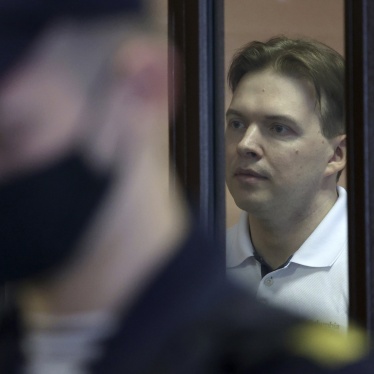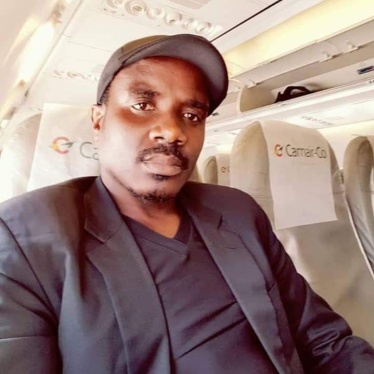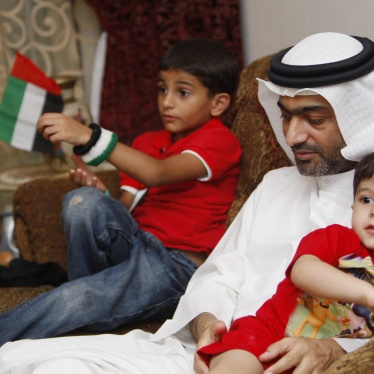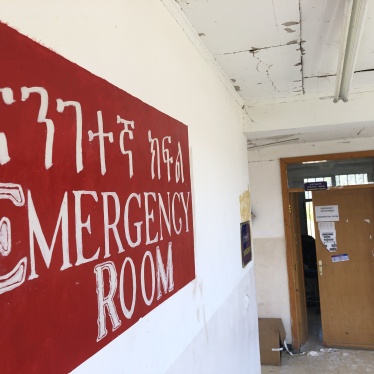According to telephone interviews conducted by Human Rights Watch, three minors, E.B. (17 years old), N.Ç. (16 years old) and M.K. (16 years old) were detained on October 2, 2005, after one of them complained to the police that a motorcyclist had injured him. Rather than pursue the complaint, police officers detained the complainant and his friends. In separate incidents, the same police officers also detained C.Þ. (15 years old) and I.Z. (18 years old) from the same area. These arrests took place shortly after the arrests of the first three minors, while E.B., N.Ç., and M.K. were kept waiting in a police vehicle. C.Þ. was detained for carrying a knife; I.Z. was detained after he was beaten by private security officers for trying to approach a singer during a concert that had taken place that day.
All five detainees were taken in the same police vehicle to Ordu Police Headquarters. According to E.Ç., father of one of the minors, the youngsters said they were beaten while in transit, and were then beaten once they arrived at police headquarters, where they were kept together in the same room. The minors reported in official statements that police officers then separated the group, stripped them naked, and squeezed their testicles, while subjecting them to verbal abuse. They also stated that police officers threatened to rape them and to take photographs of them while naked. I.Z. confirmed that he saw the minors being beaten and stated that he was also beaten by the same police officers in the police vehicle and at Ordu Police Headquarters.
Three of the minors, E.B., N.Ç., and M.K., were not taken to the hospital for examination, as required by law. The police officers also reportedly threatened further ill-treatment if the boys made any complaint against police officers. C.Þ. and I.Z., on the other hand, were taken to the hospital by the police officers, where they were given medical reports.
Quite apart from the allegations of torture, there were also serious breaches of detention procedures, since as minors, four of the five detainees should have been immediately referred to the prosecutor or released, instead of being held for two and a half hours. The children's parents were not informed of their whereabouts. Moreover, all five detainees, including I.Z., were denied access to a lawyer.
Following their release without charge, E.B., N.Ç., and M.K. applied for medical examinations. Forensic medical reports issued by Ordu State Hospital are consistent with the allegations of ill-treatment; the reports document bruises and cuts to various parts of the boys' bodies, including the face, neck, back, and ankles.
The families of all five youths made official complaints to the Ordu Chief Public Prosecutor's Office.
In another incident, according to the newspaper Evrensel (Universal) of October 24, 2005, two men, Sabri Varol and Cihangir Kýlýç, were beaten by police officers on October 14, 2005. The men claim that two police cars approached them as they were saying farewell to each other; eight police officers got out of the cars and started beating them on the street for no apparent reason. As with the cases described above, the two men claim that police officers continued to beat them as they were transported in the police car and on arrival at Ordu Police Headquarters. Sabri Varol, who has a heart condition, reported that police officers did not stop beating him when he told them about his condition. When he passed out, police apparently revived him by splashing water on his face, and then continued to beat him.
When Sabri Varol's condition worsened, both Sabri Varol and Cihangir Kýlýç were taken to Ordu State Hospital. The families of the detainees were at no point informed of their whereabouts, and the detainees were denied access to a lawyer. After their release without charge, both detainees made official complaints to the Ordu Public Prosecutor's Office.
As you know, Human Rights Watch has repeatedly stressed the importance of active supervision of places of interrogation as one of the most effective ways of ensuring that allegations of ill-treatment and torture continue to diminish.
Since 1999, governors have had a duty to supervise all places of detention in their province. Following this incident, it would be essential to learn whether or not the Ordu Police Headquarters had been regularly inspected by the governor, and prosecutor. Public reporting, as previously urged by Human Rights Watch, would help to ensure that internal monitoring does take place.
Ministers also clearly have a duty to supervise the proper functioning of the monitoring program. We therefore urge the Human Rights Directorate of your ministry, as well as the Interior Ministry, to conduct a thorough investigation separate from the criminal investigation into these allegations, to determine whether vital detention procedures were ignored at Ordu Police Headquarters, and if so, why.
Finally, in the past year, provincial human rights boards, operating under the Human Rights Directorate of your ministry, have begun to carry out announced and unannounced visits to police stations. In many provinces these visits have been led by bar association and medical association representatives. Human Rights Watch believes that these visits are extremely effective in helping to eliminate the remaining cases of ill-treatment in Turkish police stations.
Human Rights Watch believes that it is no coincidence that these latest allegations should arise in the province of Ordu, where the provincial human rights board has not visited any police stations. These grave reports of torture of both juveniles and adults stand in stark contrast to the positive trend maintained throughout most of Turkey during most of this year, and show how heavy the price of any lapse of vigilance can be. We urge that the program of police station visits be extended and strengthened throughout the country.
Sincerely,
Holly Cartner
Executive Director
Europe and Central Asia division
Human Rights Watch
Cc:
Mr. Abdülkadir Aksu, Interior Minister, Ankara
Kemal Yazýcýoðlu, Provincial Governor, Ordu
Delegation of the European Commission to Turkey, Ankara





